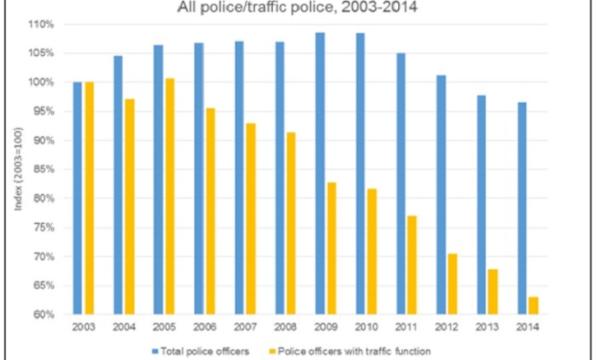Cycling UK urges Government to implement MPs’ road laws report

Cycling UK's Policy Director Roger Geffen MBE, who gave evidence at the inquiry, said: “The Committee’s report is a clarion-call to strengthen roads policing. It seems pretty clear that recent cuts have had a drastic cost on the lives and limbs of child and older cyclists alike.
“Instead of rabble-rousing talk about ‘Ending the war on the motorist’, Ministers must act to stop the slaughter of cyclists and other vulnerable road users, if they want to maximise the health and other benefits of cycling.”
The Commons Transport Committee's report voices concern over the decline in roads police numbers highlighted by Cycling UK, from 7,104 full-time-equivalent officers (5% of the force) in 2005 to 4,356 (3.4% of the force) in 2014. It also cites huge regional variations in the extent of these reductions, with the South West seeing a 45% cut in roads police officer numbers.
The report echoes Cycling UK’s concerns over the disproportionate increases in serious cycle injuries, recalling that the Committee’s previous report on cycle safety had urged the Government to tackle both actual and perceived safety for cyclists.
The Committee points out that the Government has been measuring the proportion of people who think it is “too dangerous for them to cycle on the roads”, citing figures showing that this indicator may have worsened slightly since 2011 (from 45% to 48% who agreed with this statement).
They note that road safety education “has been found to be most effective when used in concert with enforcement”, adding that “the likelihood of enforcement must be credible in order to successfully back up an education campaign.” This too echoes a point that Cycling UK has been stressing for many years. The Committee calls on the Government to “take measures to support police forces in maintaining the number of specialist police officers.”
The Committee also picked up on Cycling UK's concerns about the way that “causing death by dangerous driving” prosecutions have been replaced by “causing death by careless driving”, since the latter offence was introduced in 2008. Between 2009 and 2014, the total number of prosecutions for "causing death by..." offences has been pretty consistent, at slightly over 300 a year. However the number of convictions for causing death by dangerous driving has plummeted from 214 to 123, while causing death by careless driving convictions have rocketed, reaching 168 convictions in 2014. Though this was beyond the scope of the inquiry, the committee has urged the Justice Select Committee to investigate this apparent downgrading of the distinction between 'careless' and dangerous' driving. This recommendation is particularly timely, given the Government’s commitment to carry out a review of road traffic offences and penalties, largely in response to Cycling UK’s Road Justice Campaign.
The Committee also echoed Cycling UK's concerns over the need to tackle lorry safety. They commended the way Transport for London, the Metropolitan Police and the Driver and Vehicle Standards Agency (DVSA) have recently collaborated in setting up the London Freight Enforcement Partnership, to tackle dangerous lorries and lorry operators, urging the Government to take a similar approach elsewhere.
Cycling UK agrees, but would add that it is particularly important to strengthen the role of the Traffic Commissioners, who decide whether lorry operators should be granted licences or should have them removed. Cycling UK has highlighted two cases where the Traffic Commissioners only took action following the convictions of lorry drivers who had killed cyclists, where the evidence brought to light clear safety failings by the operators themselves.
Finally, the report reiterates Cycling UK's concerns that driver retraining courses and fixed penalties are an insufficient deterrent – though Cycling UK would add that this may well be due to the reluctance of the courts to impose bans on drivers who have reached 12 points.
The Committee calls on the Government to assess the effectiveness of both sanctions. Cycling UK agrees but believes they could have gone further, by urging the greater use of driving bans as part of the Government’s forthcoming review of road traffic offences and penalties.
Notes to editors
Cycling UK, the national cycling charity, inspires and helps people to cycle and keep cycling, whatever kind of cycling they do or would like to do. Over a century’s experience tells us that cycling is more than useful transport; it makes you feel good, gives you a sense of freedom and creates a better environment for everyone. www.ctc.org.uk
1. Cycling UK's written evidence to the Transport Committee is available to download here: https://www.cyclinguk.org/sites/default/files/media_library/users/SamJo… It includes graphs showing how the numbers of prosecutions, convictions and driving bans have all fallen more steeply than the reductions in serious and fatal injuries over the same time period.
2. Road police numbers have fallen by 37% since 2003, while total police numbers are down by just 3.5%. See http://www.cyclinguk.org/news/20150527-xx
3. The proportion of fatal and serious road injuries which involve cyclists, pedestrians and motorcyclists has risen sharply to 60%, up from 52% in 2005-9.
4. During the inquiry and elsewhere, Cycling UK has been highlighting how the Traffic Commissioners were not made aware of the need to investigate lorry operators AJ Drummond and Frys Logistics following the deaths of cyclists Alan Neve, Toby Wallace and Andrew McMenigall, until the drivers involved were convicted at trial. Both have since had their licences revoked, but had been able to continue operating for nearly two years after these fatal collisions – see http://www.cyclinguk.org/category/tags/traffic-commissioners
Press contact information
Cycling UK Press Office
Email: publicity@cyclinguk.org
Telephone: 0844-736-8453

